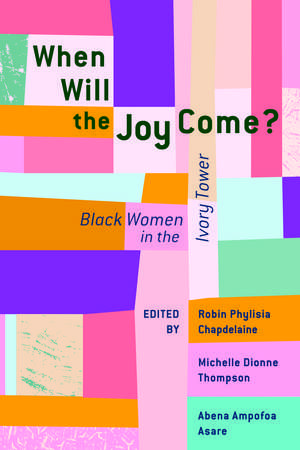When Will the Joy Come?: Black Women in the Ivory Tower: African American Intellectual History
Autor Robin Phylisia Chapdelaine, Dr. Abena Ampofoa Asare, Dr. Michelle Dionne Thompsonen Limba Engleză Paperback – 25 aug 2023
Joy is a mixture of well-being, pleasure, alignment, and purpose that can be elusive for Black women scholars. With racial reckoning and a global pandemic as context, this volume brings together honest and vital essays that ponder how Black women balance fatigue and frustrations in the halls of the ivory tower, and explore where, when, and if joy enters their lives. By carefully contemplating the emotional, physical, and material consequences of their labor, this collection demonstrates that joy is a tactical and strategic component of Black women’s struggle.
Preț: 257.51 lei
Nou
Puncte Express: 386
Preț estimativ în valută:
49.27€ • 51.58$ • 40.77£
49.27€ • 51.58$ • 40.77£
Carte indisponibilă temporar
Doresc să fiu notificat când acest titlu va fi disponibil:
Se trimite...
Preluare comenzi: 021 569.72.76
Specificații
ISBN-13: 9781625347367
ISBN-10: 1625347367
Pagini: 280
Dimensiuni: 152 x 229 x 23 mm
Greutate: 0.3 kg
Editura: University of Massachusetts Press
Colecția University of Massachusetts Press
Seria African American Intellectual History
ISBN-10: 1625347367
Pagini: 280
Dimensiuni: 152 x 229 x 23 mm
Greutate: 0.3 kg
Editura: University of Massachusetts Press
Colecția University of Massachusetts Press
Seria African American Intellectual History
Notă biografică
ROBIN PHYLISIA CHAPDELAINE is associate professor of history at Duquesne University.
MICHELLE DIONNE THOMPSON is assistant adjunct professor of Black studies at the City College of New York.
ABENA AMPOFOA ASARE is associate professor of Africana studies and history at Stony Brook University.
MICHELLE DIONNE THOMPSON is assistant adjunct professor of Black studies at the City College of New York.
ABENA AMPOFOA ASARE is associate professor of Africana studies and history at Stony Brook University.
Recenzii
“The focus on joy makes this collection indispensable among books that consider Black women and women of color in higher education. Readable and engaging, When Will the Joy Come? makes a significant contribution to the intersecting fields of women’s studies, African American studies, and higher education administration.”—Shanna Greene Benjamin, author of Half in Shadow: The Life and Legacy of Nellie Y. McKay
“The contributors to When Will the Joy Come? offer personal perspectives on the multiple meanings of ‘joy’ for Black women working within the academy. A timely, compelling book.”—Carole Boyce Davies, author of Black Women's Rights: Leadership and the Circularities of Power
"Timely, relevant—as if holding up a mirror—reflecting our trials by fire, but also framing, theorizing, and offering strategies of resistance. It is balm and hope. I heard a speaker say recently that hope is the purest form of love. This surprised me, as I thought they might say that hope was the purest form of faith, or trust, or support. But I have to agree that this text gives me (and possibly others) so much hope. And I feel a depth of love within the pages—for rendering us and our experiences visible. Hope that we can not simply break into academia and survive its harsh terrain, but co-create spaces, moments, and burgeoning joy."—Toni King, director of the Center for Black Studies, Denison University, and coeditor of Black Womanist Leadership: Tracing the Motherline
“The contributors to When Will the Joy Come? offer personal perspectives on the multiple meanings of ‘joy’ for Black women working within the academy. A timely, compelling book.”—Carole Boyce Davies, author of Black Women's Rights: Leadership and the Circularities of Power
"Timely, relevant—as if holding up a mirror—reflecting our trials by fire, but also framing, theorizing, and offering strategies of resistance. It is balm and hope. I heard a speaker say recently that hope is the purest form of love. This surprised me, as I thought they might say that hope was the purest form of faith, or trust, or support. But I have to agree that this text gives me (and possibly others) so much hope. And I feel a depth of love within the pages—for rendering us and our experiences visible. Hope that we can not simply break into academia and survive its harsh terrain, but co-create spaces, moments, and burgeoning joy."—Toni King, director of the Center for Black Studies, Denison University, and coeditor of Black Womanist Leadership: Tracing the Motherline








